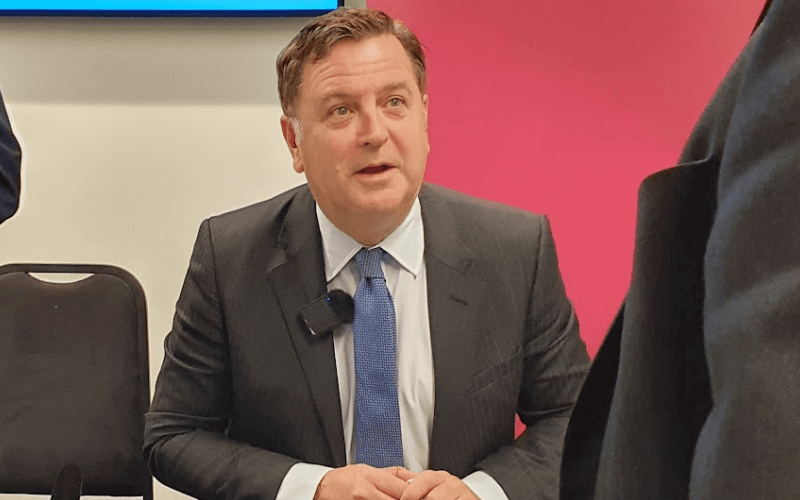The work and pensions secretary has sparked fresh concerns that a Conservative government would target the main disability benefit – personal independence payment (PIP) – for cuts and means-testing if it wins the next general election.
Both Mel Stride and the chancellor, Jeremy Hunt, spoke at the party conference in Manchester this week about the significant increase in the number of people claiming out-of-work disability benefits.
Stride (pictured) spoke of this “unsatisfactory” trend over the last four years, while Hunt spoke in his main conference speech of the 100,000 people a year leaving work to claim the limited capability for work-related activity element of universal credit (see separate story).
But Stride was also asked at a Centre for Social Justice fringe event this week whether PIP “would ever be incorporated into the universal credit system”.
Three months ago, Disability News Service (DNS) reported that the Conservative party appeared to be considering plans to means-test disability benefits like PIP as a way of cutting spending.
DNS was told at the time that participants in focus groups had been asked questions about which people “deserve” various benefits and what they think about the idea of means-testing “extra cost” benefits.
Although DNS was unable to confirm that it was the Conservative party that paid for and ran the focus groups, such a move would almost certainly involve benefits such as PIP, disability living allowance and attendance allowance.
The introduction of means-testing could mean these benefits eventually being folded into the universal credit system, and payments in future only going to those with less than a certain level of income, savings and investments.
There have been concerns about the possibility of a Conservative-led government means-testing PIP since the publication of its Shaping Future Support green paper, two years ago.
That green paper suggested that ministers could create a “new single benefit” to simplify the disability benefit application and assessment process, which could “provide support for disabled people and people with health conditions on low income and with extra costs”.
The then work and pensions secretary Therese Coffey later told DNS at a fringe meeting at the annual conference in October 2021 – also held in Manchester – that merging PIP with universal credit was “on the table” as part of a fresh wave of social security reforms.
Just a month later, DNS reported how a Department for Work and Pensions civil servant told a disability charity that the government planned to merge PIP with universal credit, although not until at least 2027.
Asked this week whether PIP would be incorporated into the UC system, Stride pointed out that existing Conservative plans would see PIP act as the “gateway” that disabled people would have to go through instead of the work capability assessment to claim out-of-work disability benefits, through a new health element of universal credit.
But he then criticised PIP – introduced by his own party 10 years ago to replace working-age disability living allowance – even though it is seen by disabled people as a hugely-important contribution to meeting their extra disability-related costs, despite its deeply flawed assessment process.
Stride told the event: “There are some issues around PIP in that it is a fairly blunt instrument because it’s there basically to compensate for the extra costs of disability and yet what we know is that for some people [who need] a grab rail to get into the bath or an extra step to be able to reach the microwave, and yet the amount of course is relative to those kind of items really quite high.”
He appeared to be suggesting that many claimants would not need PIP if they had such adjustments made to their homes.
Stride then said that the demand for PIP “has been increasing quite dramatically recently, so there are some issues around PIP”.
He said there were no “immediate plans to reform PIP”, but he did not rule out future changes.
A note from the editor:
Please consider making a voluntary financial contribution to support the work of DNS and allow it to continue producing independent, carefully-researched news stories that focus on the lives and rights of disabled people and their user-led organisations.
Please do not contribute if you cannot afford to do so, and please note that DNS is not a charity. It is run and owned by disabled journalist John Pring and has been from its launch in April 2009.
Thank you for anything you can do to support the work of DNS…

 Government ignores warnings of new DWP deaths, and UN intervention, as MPs pass universal credit cuts bill
Government ignores warnings of new DWP deaths, and UN intervention, as MPs pass universal credit cuts bill Urgent letter from UN to Labour government warns: We think your cuts continue Tory attack on disability rights
Urgent letter from UN to Labour government warns: We think your cuts continue Tory attack on disability rights Race against time to secure DWP deaths evidence before parliament passes new benefit cuts bill
Race against time to secure DWP deaths evidence before parliament passes new benefit cuts bill